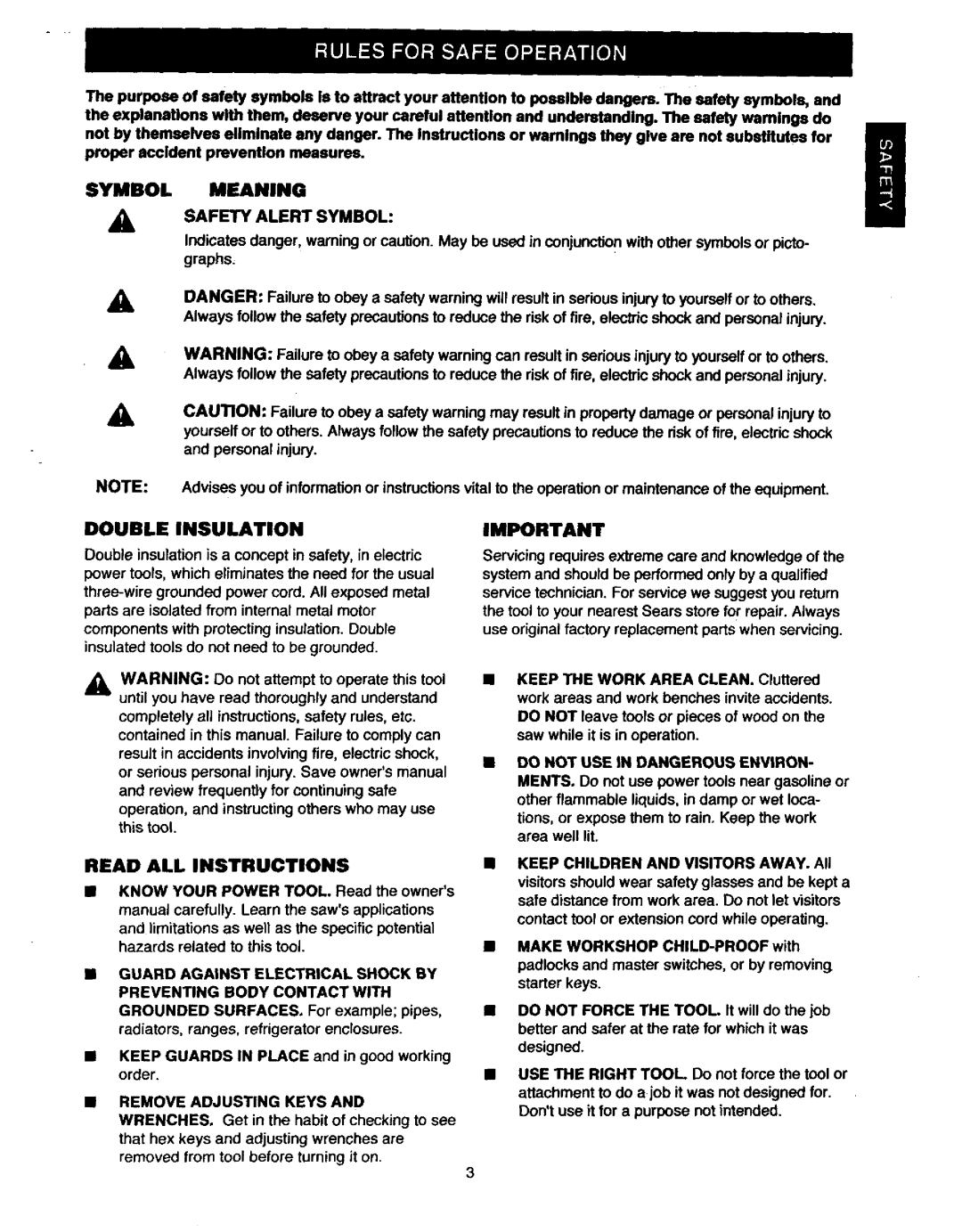
The purpose of safety symbols is to attract your attention to possible dangers. The safety symbols, and the explanations with them, deserve your careful attention and understanding. The safety warnings do not by themselves eliminate any danger. The Instructions or warnings they give are not substitutes for
proper accident prevention measures. | H | ||
SYMBOL | MEANING | ||
A | SAFETY ALERT SYMBOL: | ||
| Indicates danger, warning or caution. May be used in conjunction with other symbols or pioto- | ||
| graphs, |
|
|
A | DANGER: | Failure to obey a safety warning will result in serious injury to yourself or to others. | |
| Always follow the safety precautions to reduce the risk of fire, electric shock and personal injury. | ||
& | WARNING: | Failure to obey a safety | warning can result in sedous injury to yourself or to others. |
| Always follow the safety precautions to reduce the risk of fire, electric shock and personal injury. | ||
A | CAUTION: | Failure to obey a safety warning may result in property damage or personal injury to | |
| yourself or to others. Always follow the safety precautions to reduce the risk of fire, electric shock | ||
| and personal injury. |
| |
NOTE: | Advises you of information or instructions vital to the operation or maintenance of the equipment. | ||
DOUBLE | INSULATION |
| IMPORTANT |
Double insulation is a concept in safety, in electric power tools, which eliminates the need for the usual
A WARNING: Do not attempt to operate this tool until you have read thoroughly and understand completely all instructions, safety rules, etc. contained in this manual. Failure to comply can result in accidents involving fire, electric shock, or serious personal injury. Save owner's manual and review frequently for continuing safe
operation, and instructing others who may use this tool.
READ ALL INSTRUCTIONS
MKNOW YOUR POWER TOOL. Read the owner's manual carefully. Learn the saw'sapplications
and limitations as well as the specific potential hazards related to this tool.
mGUARD AGAINST ELECTRICAL SHOCK BY
PREVENTING BODY CONTACT WITH GROUNDED SURFACES. For example; pipes, radiators, ranges, refrigerator enclosures.
•KEEP GUARDS IN PLACE and in good working order.
REMOVE ADJUSTING KEYS AND
WRENCHES. Get in the habit of checking to see that hex keys and adjusting wrenches are removed from tool before turning it on.
Servicing requires extreme care and knowledge of the system and should be performed only by a qualified service technician. For service we suggest you return the tool to your nearest Sears store for repair. Always use original factory replacement parts when servicing.
KEEP THE WORK AREA CLEAN. Cluttered work areas and work benches invite accidents. DO NOT leave tools or pieces of wood on the saw while it is in operation.
DO NOT USE IN DANGEROUS ENVIRON-
MENTS. Do not use power tools near gasoline or other flammable liquids, in damp or wet loca-
tions, or expose them to rain. Keep the work area well lit.
•KEEP CHILDREN AND VISITORS AWAY. All
visitors should wear safety glasses and be kept a safe distance from work area. Do not let visitors contact tool or extension cord while operating.
•MAKE WORKSHOP
•DO NOT FORCE THE TOOL. It will do the job better and safer at the rate for which it was
designed.
•USE THE RIGHT TOOL Do not force the tool or attachment to do a job it was not designed for. Don'tuse it for a purpose not intended.
